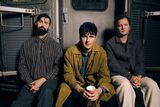Kate Bush, Hammersmith Apollo, review - 'the long wait felt worth it'
Kate Bush.
The PA plays soothing Eberhard Weber, an indication of Kate Bush’s current musical inclinations, but there’s no way it can soothe the hubbub of anticipation amongst the audience, many of whom have been waiting 35 years for this.
Then the disembodied voice of “Lily” heralds Kate’s long overdue arrival again onstage, strolling at the head of a small group of backing singers that includes her son Bertie. Barefoot and black-clad in three-quarter length coat and long fringed fabrics, she’s like a gorgeous Gothic temptress, the former mime and dance moves reduced to a stroll and waft of material, with an occasional twirl.
For a few songs, it seems like this might be all we’ll be getting, a Stevie Nicks-style show augmented by a few cute lighting effects. The band, arrayed across the back, is as meticulous as expected, tight and sleek as Kate glides through “Hounds Of Love” and a “Top of the City” that exemplifies the dynamic shifts between contemplative calm and euphoric release in her music.
Then “Running Up That Hill” draws the crowd to its feet, Kate’s voice clearly untroubled by the passage of time, ably holding its own against the two drummers’ tom-tom barrage. “King Of The Mountain” is similarly effective, climaxing in a percussionist whirling a bullroarer around his head as cannons fill the air with confetti.
But this, it transpires, is but a mere preamble to the evening’s centrepiece highlight, a presentation of the “Ninth Wave” suite that finally displays the outlandish theatrical panache that fans have come to expect from Kate Bush.
A front-screen projection of someone phoning the coastguard sets the scene for this extraordinary tale of a drowning woman’s contemplation of life. When the curtain rises, we’re on the prow of a shipwreck, sheet waves rolling across the stage as Kate, adrift in orange life jacket, bobs haplessly on a back-projection.
Two seahorses then climb out of the audience – no, really – and abduct the real Kate, leaving her backing singers (now rescuers) assailing the stage with axes and chainsaws in an attempt to rescue her from beneath the “ice”. When they pull her up, she’s berated by a priest before sinking back.
This is but the first of several coup de théâtre including a “helicopter” flying over the audience, aswirl in smoke and spotlights, a buoy bobbing across the stage, and a tragicomic sitting-room tableau set in a submerged room of cockeyed Caligari-esque angles.
Accompanied by music ranging from polyphonic choral harmonies to folksy minstrels, it’s quite stunning, undoubtedly the most ambitious, and genuinely moving, piece of theatrical pop ever seen on a British stage. Which is just what everyone was hoping for.
Independent.co.uk
Join the Irish Independent WhatsApp channel
Stay up to date with all the latest news














